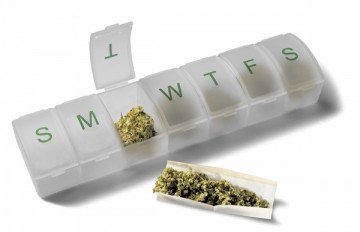Out-of-State Money Funding Medical Marijuana Campaign
Friday, October 19, 2012

The Committee for Compassionate Medicine collected a total of $1,071,762 in 2011 and 2012 according to reports filed with the state's Office of Campaign and Political Finance through October 5th. A full $1.02 million of the funds came from Peter B. Lewis, chairman of the Progressive Insurance Company, based in Mayfield Village, Ohio.
Lewis, who sits on the Forbes 400 list with an estimated net worth of $1.1 billion, has given millions to support marijuana reform initiatives in states across the country over past few decades.
Meanwhile, the group opposing the legalization of medical marijuana, Vote No on Question 3, has raised a total of $2,500 this year.
The Questions Around Question 3
The proposed Medical Use of Marijuana law, or Question 3, would remove state criminal and civil penalties for the medical use of marijuana by qualifying patients. In order to qualify, patients must be diagnosed with a debilitating medical condition, such as cancer, glaucoma, Parkinson's disease, multiple sclerosis or several others.
Under the proposed law, patients would be permitted to possess up to a 60-day supply of marijuana for personal medical use, the amount of which would be determined by the Commonwealth's Department of Public Health.
Non-profit medical marijuana treatment centers would be permitted to grow, process and provide marijuana to patients and registered caregivers. A maximum of 35 treatment centers could be established in 2013, with at least one but no more than five in each of the state's counties. The number of treatment centers could later be modified in future years by the Department of Public Health.

"This proposal has been endorsed by many patients, their families, medical professionals, and law enforcement officials who believe that a smart, science-based approach can help suffering patients without encouraging inappropriate drug use. In fact, allowing the medical use of marijuana will lessen the need for dangerous narcotics like morphine and OxyContin."
Dr. Jay Broadhurst of Vote No on Question 3 wrote the argument against medical marijuana, citing the law's loopholes and high potential for corruption and exploitation.
"We do not need 35 pot shops to serve the less than 1 percent truly in need of medical marijuana in Massachusetts," he wrote. "There is already a marijuana pill available for prescription (Marinol). Other marijuana medication will be available in pharmacies soon."
Broadhurst urged tighter restrictions and more physician oversight for medical marijuana and to pursue solutions that fall within the existing frameworks for medical care.
"Let’s develop medications properly and find a better path for seriously ill patients, who should not be arrested."
A Source of Relief or More Problems?
A survey of 1,051 likely Massachusetts voters conducted by Public Policy Polling earlier this month found that 57 percent of respondents said they would vote yes on Question 3 if the election was today, while 31 percent said they would vote not, and 12 percent said they were undecided.
The numbers were nearly identical to those PPP found when it asked voters about Question 2, the Prescribing Medication to End Life ballot measure, which found 56 percent in favor, 30 percent opposed and 14 percent undecided.
"The downside to Question 3 is so trivial compared to the downside to Question 2," said John Kelly, director of Second Thoughts, a group of Massachusetts residents with disabilities that opposes the assisted-suicide law because of its lack of safeguards and protections especially for the elderly and disabled.

"We're not saying it's the answer to Question 2, but this is the way we should go."
Heidi Heilman, president of the Massachusetts Prevention Alliance, which is part of the Vote No on Question 3 campaign, said the state's issues with marijuana increased following the decriminalization of the drug several years ago.
"When decriminalization passed, we lost our leverage to get kids into support they needed, said Heilman, who has 20 years experience working in substance abuse treatment and recovery as a clinician.
With medical marijuana already making its way into the Commonwealth through second-hand distribution by patients with prescriptions in other states, Heilman sees a real risk for increased use among teens if the drug becomes more readily available. Marijuana already tops the list as the number one drug for teens in treatment in the Bay State.
"People's misperception is that Question 3 is a way to get our sick loved ones the oppoorrutnity to use marijuana," said Heilman.
"In fact, there are so many loopholes that if this passes, we'll look like California in a very short time."
Related Articles
- NEW: Mass Medical Society Takes Stance on Physician-Assisted Suicide and Medical Marijuana
- Voters to Decide Marijuana and Right to Die
- Who Wins With Medical Marijuana?
- Count Us In: NEADS Partners with Local Prisons to Train Assistance Dogs
- Millions Spent in Fight Over MA Assisted-Suicide Law
- Leonardo Angiulo: A Look at Medical Marijuana Laws




Follow us on Pinterest Google + Facebook Twitter See It Read It